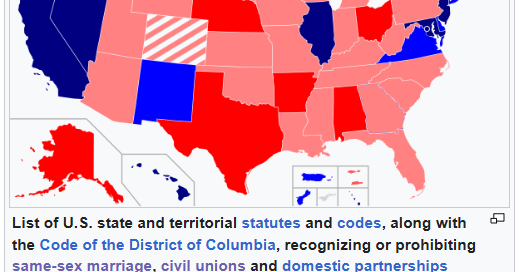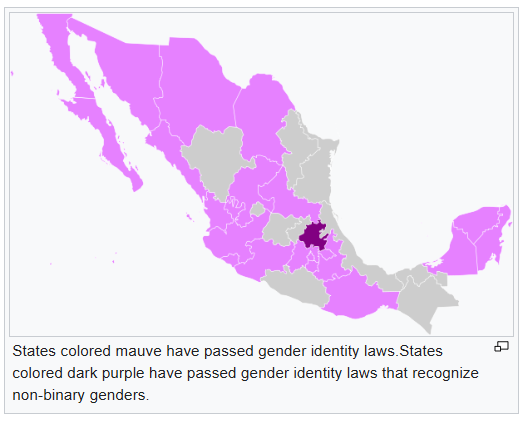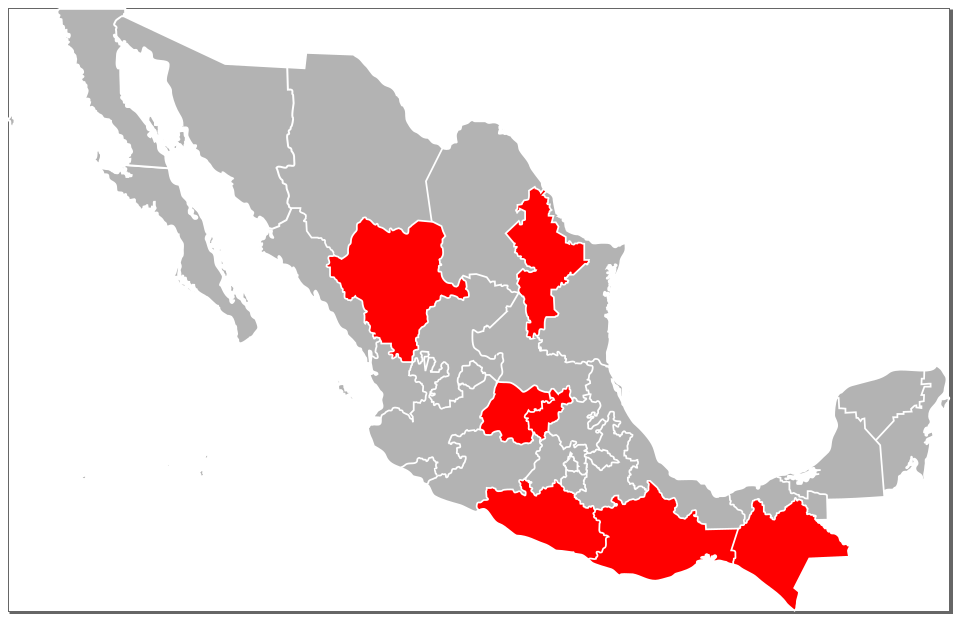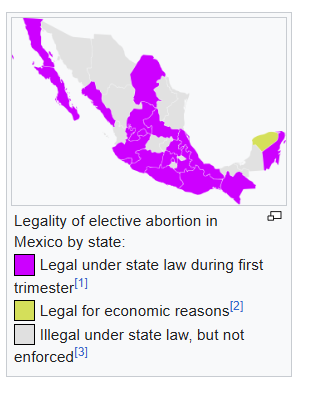2024 LGBTQ Rights Global Progress - North America
Challenges and victories in USA, Canada, and Mexico, with warning signs ahead
Every year around this time, I like to stop and take a look back at how the fight for global LGBTQ rights has evolved over the previous 12 months to see how far we’ve come and try to predict what lies ahead.
This is a *huge* project that takes an immense amount of time to pull together, and I’ll be releasing parts of it daily this week, with individual posts focused on North America (today), Latin America and the Caribbean, Europe, Asia-Pacific, Africa, and Global Trends.
Before we dive in, a reminder that I keep this newsletter free so that anyone who wants or needs this information anywhere in the world can access it. But if you’re able to support my work, I’d really appreciate the help to keep it going. Consider becoming a paid subscriber to work via the buttons below — or just make a donation through Venmo or Paypal.
Let’s get into it.
United States
Well, obviously, the story of the year is Donald Trump winning the presidency while Republicans won full control of Congress. But most of the fallout that LGBTQ people are going to suffer from that will happen next year, so let’s not get ahead of ourselves.
The Republican Party focused much of its anti-LGBTQ agenda on trans people in 2024, with a particular focus on youth, medical care, and school curricula.
A Tennessee law banning gender care for trans youth is currently being challenged at the Supreme Court. If SCOTUS upholds the law, expect Republicans to enact even broader bans – likely banning all gender care – going forward.
Florida and Texas both went a little further, banning gender changes on drivers’ licenses. These laws are being challenged. Texas is also pursuing gender care providers in court.
As red states have already largely enacted much of the anti-LGBT agenda of the far right, expect 2025 to be full of new and inventive ways for Republican legislators to pander to the bigots. Bans on pride flags, bans on DEI initiatives, bigger loopholes in discrimination law to allow wider exceptions for bigots, even “propaganda” laws straight out of Russia are likely on the table. One Michigan legislator is openly calling for same-sex marriage to be outlawed again.
Democrats did score a handful of important victories in 2024. California, Colorado, and Hawaii all stripped defunct marriage bans from their state constitutions, and New York added an equal rights amendment that bans discrimination and ought to protect marriage as well. Colorado still has a marriage ban in its statute books, which state lawmakers will presumably delete in the new term.
Democrats in Pennsylvania passed a bill to repeal its statutory same-sex marriage ban through the state house, but it was blocked in the Republican-controlled senate, as were bills banning anti-LGBT discrimination and penalizing hate crimes. Voters returned an identical legislature, so these priorities are unlikely to advance in 2025, but who knows? Maybe moderate Republicans will try to compromise here to win over voters in what may be a tough 2026 election.
Voters also approved protecting abortion rights in Arizona, Colorado, Maryland, Missouri, Montana, New York, and Nevada, although in Nevada, the vote will have to be re-approved in 2026. Abortion rights were defeated in Florida, Nebraska, and South Dakota.

Michigan Democrats held a trifecta in the state legislature for the first time in decades and used that power over the past two years to enact several key LGBT rights initiatives. Last year, they passed a nondiscrimination law and banned conversion therapy. This year, they updated family law to legalize commercial surrogacy, abolished the gay/trans panic defense, and at the last minute, they passed a hate crime law that includes protections for LGBT people and bill to make it easier for trans people to change their legal name and gender (including an X option) – those latter bills await the governor’s signature. Unfortunately, a bid to repeal the state’s defunct sodomy laws went nowhere in this time, as did efforts to repeal the state’s adultery statute. Democrats will lose control of the state house in the new year, so expect progress to stall here.

Speaking of sodomy laws, Massachusetts Democrats once again let a bill to delete the state’s sodomy and “walking while trans” laws died without a vote in the state house.
Minnesota Democrats were similarly productive with their first trifecta in decades, updating discrimination law, banning conversion therapy, and deleting the state’s sodomy law last year. This year, they banned the gay/trans panic defense and banned anti-LGBT book bans in public schools and libraries. Again, Democrats have apparently lost the trifecta in the new year. Voters delivered an evenly divided state house, but then one Democrat was disqualified from the house on residency grounds, so Republicans have a one-seat majority until a special election is called and have said they will not honor a previous power-sharing agreement.
So, further pro-LGBT legislation is unlikely to pass, but anti-LGBT legislation likely isn’t going forward either.
Democratic governors in Kentucky and Pennsylvania also used executive actions to effectively ban conversion therapy in those states.
In Tribal Jurisdictions, efforts to repeal same-sex marriage bans in the Muscogee Nation and Navajo Nation both failed this year.
Looking ahead to 2025, the prospects for LGBT rights are grim.
Trump is already tweeting that he plans to ban all recognition of transgender and nonbinary people and will ban trans people from serving in the military.
The only state legislatures Democrats flipped were in Alaska, where their coalition with several ‘moderate’ Republicans won or maintained control of both chambers. However, coalition leaders are already saying they won’t pass any socially progressive legislation, and it would be vetoed by the Republican governor anyway.
Virginia Democrats have scheduled a vote on deleting the state constitutional ban on same-sex marriage for the new year; they’ll have to win fall elections and pass it again in 2026 before it can be put to voters that year.
There’s a chance for Oregon Democrats, who now have supermajorities in both houses, to put a marriage amendment on the ballot for 2026. And there is some talk that activists in Michigan and Ohio could organize a citizen initiative to delete their marriage bans as well.
2026 is a long way away, but it’s the next big opportunity for LGBT rights advances, assuming democracy lasts that long. By that point, hopefully, voter anger at the inevitable mayhem of the second Trump presidency will motivate turnout for a Democratic Party that has rebuilt itself.
Canada
It’s an interesting moment to be writing about Canada. The incumbent federal Liberal government under Justin Trudeau has delivered much of the enhanced welfare state and infrastructure spending that voters demanded when they were elected nine years ago, but runaway inflation, especially around housing, has erased much of the value of that. Combined with what appears to be a massive influence op from India and Russia – and now Trump? – against Trudeau, and we’re staring down the very strong likelihood of the Conservative Party winning an historically enormous majority of Parliament in an election that could happen as early as March.
More likely is that Trudeau steps down as Liberal Party leader early in the new year, and the government limps along to the scheduled election date in October, after which the Conservatives sweep in and start in on the anti-trans nonsense that is motivating a large chunk of their base.
And while it may be early to eulogize the Trudeau government, it’s worth noting that the Liberals did deliver on some major LGBT rights promises: deleting sodomy laws and the differential age of consent from the criminal code, updating obscenity laws, restoring funding to rights organizations, including trans people in hate crime/speech and discrimination laws, and banning conversion therapy.
Right-wing conservative forces in Canada have become increasingly reactionary and violent against LGBT people, and trans people in particular, and these groups hold outsized influence with the various conservative parties in Canada.
Last year, they scored a victory when New Brunswick’s conservative premier announced a new policy that would require parental notification and consent if a student is trans. The regulation, which was introduced with limited consultation, led several cabinet ministers to resign in protest, and led the charge for provincial conservatives to campaign on anti-trans policies across Canada.
That strategy tended not to work for conservatives. In October, Higgs’s government was voted out in favor of the New Brunswick Liberals under Susan Holt, who had pledged to rescind the policy and ensure schools are welcoming for all LGBTQ+ students, and have already done so.
Similarly, Manitoba’s conservative government was voted out last October after pledging to introduce a similar policy, and the British Columbia Conservatives lost their bid to replace the province’s NDP government in elections this October. Still, Saskatchewan’s conservative government won reelection in October after introducing a similar policy earlier in the year, so the record is 3 losses out of 4 contests for anti-LGBT policies.
Alberta’s conservative government just passed some of the most sweeping anti-transgender legislation Canada has seen in quite some time, including bans on classroom discussion of LGBTQ+ issues and participation in gender-appropriate sports. Alberta is not scheduled to have an election until 2027.
Alberta’s anti-trans laws have already been challenged in court, but Saskatchewan’s government used a constitutional provision to prevent any legal challenges to its anti-trans laws for five years after an initial loss in court.
But conservative governments in Ontario and Quebec, which had initially announced plans to introduce parent notification and consent rules for trans students, have yet to bring forward such policies or regulations.
The federal Conservatives are quick to dismiss alarm over possible anti-LGBT policies they would enact and will frequently point out that party leader Pierre Poilievre’s adoptive father is a gay man, and deputy leader Melissa Lantsman is a lesbian.
Poilievre, however, has said trans women should be barred from women’s spaces, and Lantsman backed that up. It’s not entirely clear what PM Poilievre would do about that. Canada’s federal government only regulates the federal civil service, armed forces, airports, railways, banks, and federal prisons. We shall see.
Mexico
Mexico saw numerous legislative victories for LGBTQ people, thanks in large part to the continued dominance of the progressive MORENA party nationwide, culminating in the election of Mexico’s first female President Claudia Scheinbaum this year.
The Supreme Court delivered a landmark ruling that trans women must be considered women within the scope of laws dealing with violence against women.
The federal congress finally passed a conversion therapy ban in June and it was quickly signed into law. Guerrero passed a state conversion therapy ban this year as well, bringing the total to 19 states with local bans. Some other states are also still working on local conversion therapy bans, which would supplement the federal law.
Same-sex marriage has been legal nationwide since the last state legalized it in 2022. But several states still have not updated their laws to reflect legalization done through courts or by gubernatorial decree. Just last week, Chiapas became the latest state to codify same-sex marriage into law. Three other states remain: Aguascalientes, Guanajuato, and Chihuahua, although legislators in the latter two are working on codification bills now. There was a brief worry that Guanajuato’s executive order legalizing same-sex marriage lapsed this year, but the governor quickly reissued it.
Tabasco state legalized adoption by same-sex couples this year. Most states allow all married couples to adopt, but at least eight states still have civil codes that do not allow it. The situation in a ninth state, Baja California Sur, is unclear. The BCS congress passed a same-sex adoption law in 2022, but this March, the governor belatedly vetoed it, insisting on unspecified changes. I haven’t seen any news that the BCS congress made any changes or overrode the veto, but when I look through the BCS civil code dated July 2024, I don’t see any mention of a ban on same-sex parents adopting. Did that quietly get fixed, or am I missing something? Mexican readers – or anyone with a better knowledge of the issue or the Spanish language, please fill me in!
Michoacan amended its state constitution to ban all anti-LGBTI discrimination this year.
Hidalgo state passed a hate crime law, while Mexico City strengthened its existing hate crime laws. A federal hate crime bill, the Osiel Baena Law (named after a murdered gay man), is pending in congress.
Yucatan and Campeche states passed gender identity recognition laws. That leaves only ten states left to update their laws. Durango state congress is currently considering a gender identity law.
Several Mexican states have laws barring people with HIV from getting married, but that number is dropping, Sinaloa and Quintana Roo ended their bans last year (although QR requires HIV-positive partners to disclose and sign a waiver). This year, Mexico City repealed its law against transmission of HIV; similar repeals have been proposed in Sinaloa and Baja California.
Decriminalization of abortion has also advanced steadily since a Supreme Court ruling finding women have a right to reproductive freedom, with 6 states having liberalized abortion laws, at least up to 12 weeks, bringing the total to 19 of 32 states. Four other states have been ordered by the courts to amend their abortion laws, but have failed to do so – Morelos, Chihuahua, Nayarit, and Yucatan. Mexico City completely decriminalized abortion. There is also a push to completely remove abortion from the federal penal code.
That’s it for today. Thanks for reading this long. Tomorrow I’ll be back with a look at Latin America and the Caribbean.











💀💀💀
𝗧𝗛𝗘 𝗢𝗕𝗜𝗧𝗨𝗔𝗥𝗬 𝗢𝗙 𝗗𝗢𝗡𝗔𝗟𝗗 𝗝. 𝗧𝗥𝗨𝗠𝗣
𝗜𝗻 𝗦𝘁𝗮𝗿𝗸 𝗖𝗼𝗻𝘁𝗿𝗮𝘀𝘁 𝘁𝗼 𝗝𝗶𝗺𝗺𝘆 𝗖𝗮𝗿𝘁𝗲𝗿, 𝗮 𝗟𝗶𝗳𝗲 𝗼𝗳 𝗖𝗼𝗿𝗿𝘂𝗽𝘁𝗶𝗼𝗻, 𝗖𝗿𝘂𝗲𝗹𝘁𝘆, 𝗮𝗻𝗱 𝗖𝗵𝗮𝗼𝘀
“Donald John Trump, the twice-impeached, thrice-indicted 45th President of the United States, died on December 29, 2024, mere weeks before he was set to be sworn in for a catastrophic second term. His death, while tragic for those still entranced by his cult of personality, offers a much-needed reprieve for a nation and world terrorized by his existence. He was 78.” Read more…
https://open.substack.com/pub/patricemersault/p/the-obituary-of-donald-j-trump?r=4d7sow&utm_campaign=post&utm_medium=web&showWelcomeOnShare=false